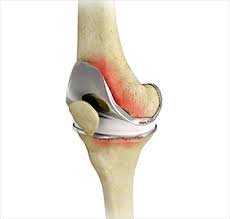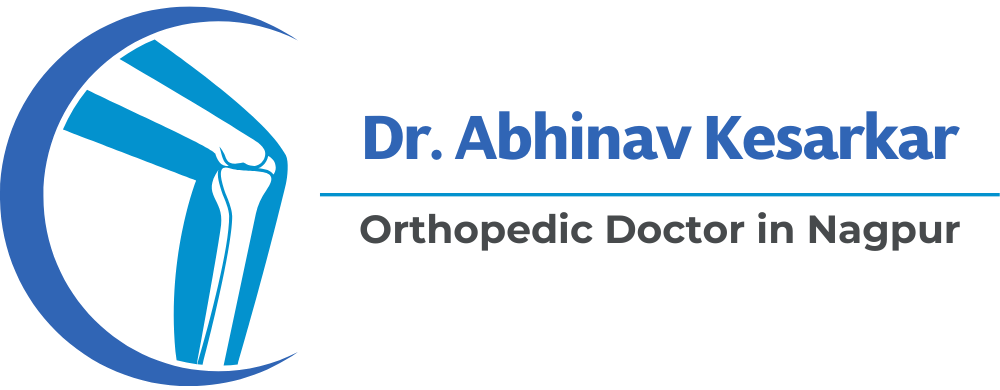Dr. Abhinav Kesarkar | Orthopedic Surgeon In Nagpur
Failed joint replacement correction in Chhindwara

Failed joint replacement correction in Chhindwara– Kesarkar Hospital
If your previous knee or hip replacement surgery has started causing pain, instability, or stiffness, it may be a sign of a failed joint replacement. In such situations, seeking expert help for Failed Joint Replacement Correction in Chhindwara is crucial. Dr. Abhinav Kesarkar, an experienced orthopedic and joint replacement specialist, offers advanced corrective solutions designed to restore mobility, reduce pain, and improve quality of life.
A failed joint replacement can affect not only movement but also confidence in everyday activities. Fortunately, with advanced surgical techniques and thorough evaluation, many patients can regain strength, stability, and comfort through joint revision surgery. Therefore, early consultation with a specialist can make a meaningful difference in treatment outcomes.
Understanding Failed Joint Replacement
A failed joint replacement occurs when the initial implant or surgery no longer provides the desired pain relief, stability, or function. Typically, this situation arises due to several factors such as wear and tear of the implant, infection, or improper alignment. As a result, patients may begin to experience pain, stiffness, or limited mobility over time.
Unlike the original procedure, joint replacement correction—also known as revision surgery—is generally more complex and therefore requires specialized expertise. Moreover, this procedure involves carefully removing or adjusting the existing implant, which must be done with high precision to ensure better long-term outcomes.
Because each case is unique, Dr. Abhinav Kesarkar takes a highly personalized approach to treatment. Before proceeding, he focuses on identifying the root cause of the failure through detailed evaluation and diagnostic imaging. Consequently, this thorough assessment helps him plan the most effective corrective procedure, ensuring both improved stability and enhanced mobility.
Furthermore, Dr. Kesarkar’s expertise in complex revision surgeries allows patients to regain function and return to their daily activities with greater confidence. Ultimately, his patient-centered approach not only addresses the underlying problem but also promotes faster recovery and long-term joint health.
Common Signs of a Failed Joint Replacement
Early identification of symptoms can significantly reduce the risk of complications. Moreover, it allows patients to receive timely treatment and achieve better recovery outcomes. Patients who require Failed Joint Replacement Correction in Chhindwara often experience:
Persistent or increasing pain after joint replacement
Joint instability or frequent dislocation
Swelling or inflammation around the joint
Limited range of motion
Clicking or grinding sounds
Warmth or redness (a possible sign of infection)
Loosening of the implant
Difficulty standing, walking, or climbing stairs
Furthermore, when these symptoms appear, they often signal underlying issues that need immediate medical attention. In addition, neglecting these warning signs may lead to worsening pain or further damage to the joint. Therefore, consulting a specialist at the earliest stage can help prevent additional complications.
Most importantly, early evaluation greatly improves the chances of successful revision surgery. As a result, patients are more likely to regain mobility, reduce pain, and restore confidence in their daily activities.
Why Joint Replacements Fail
Although joint replacement surgeries generally have high success rates, failures can still occur over time. In many cases, these failures result from several common factors. First, implant wear and tear can happen gradually, since artificial joints often degrade with years of repeated use. Next, loosening of implants may develop because of mechanical stress or progressive bone loss. In addition, even a minor infection can compromise the implant, leading to significant complications.
Moreover, improper alignment or malpositioning can create pain, instability, and reduced joint function. Furthermore, a periprosthetic fracture, which is a break around the implant, may also contribute to implant failure. Another key factor is osteolysis, or bone loss caused by the body’s inflammatory reaction to wear particles.
Beyond medical causes, lifestyle factors can also play a major role. For instance, excessive weight places more stress on the implant. Likewise, engaging in high-impact activities may accelerate wear and tear. Finally, insufficient rehabilitation often delays healing and therefore increases the risk of implant failure.
Importance of Failed Joint Replacement Correction
When a joint replacement fails, timely correction becomes absolutely critical to prevent additional damage to the bone and surrounding tissues. Moreover, early intervention can significantly reduce complications and improve long-term outcomes. Revision surgery, therefore, plays a vital role in restoring mobility and comfort.
This advanced procedure helps to:
Relieve chronic pain and discomfort, thereby enhancing patient comfort.
Restore stability and strength, which in turn improves mobility.
Prevent further bone loss or deformity, ensuring better joint structure.
Allow patients to regain independence in daily activities and routines.
Improve overall quality of life, both physically and emotionally.
Furthermore, because revision surgery is often more complex than primary joint replacement, it is essential to choose a surgeon with proven expertise. Therefore, it should be performed by an experienced Failed Joint Replacement Correction specialist in Hoshangabad like Dr. Abhinav Kesarkar. Additionally, his advanced techniques, precise surgical approach, and patient-centered care ensure safer procedures and faster recovery.
About Dr. Abhinav Kesarkar – Specialist in Failed Joint Replacement Correction in Chhindwara
Dr. Abhinav Kesarkar is a highly skilled orthopedic and joint replacement surgeon specializing in Failed Joint Replacement Correction in Chhindwara. With years of surgical expertise and advanced training, he offers comprehensive, patient-centered treatment plans that are carefully tailored to each individual case.
His approach combines several critical steps to ensure the best outcomes:
Thorough pre-surgical evaluation to identify the exact cause of failure.
Advanced imaging and diagnostics for accurate assessment.
Personalized surgical planning to address each patient’s unique needs.
Precise revision procedures that restore function and stability.
Post-operative rehabilitation and follow-up care for long-term recovery.
Moreover, Dr. Kesarkar emphasizes clear communication at every stage, ensuring that patients fully understand their condition and treatment options. Furthermore, his calm and compassionate approach creates a supportive environment that helps patients feel reassured and confident.
In addition, his use of modern surgical techniques and state-of-the-art technology significantly enhances both accuracy and safety. Consequently, patients experience faster recovery times and improved overall joint function. As a result, many individuals are able to return to their daily activities with greater comfort and mobility.
Therefore, for anyone seeking expert care in failed joint replacement correction, Dr. Abhinav Kesarkar’s clinic in Chhindwara stands out as a trusted destination for precision, safety, and long-term joint health.
Diagnostic Process Before Revision Surgery
Because every failed joint replacement case is different, an accurate diagnosis is essential for a successful correction. Therefore, Dr. Kesarkar follows a clear and structured step-by-step process to ensure precision and patient safety.
Clinical Evaluation: First, he carefully assesses symptoms, mobility, and implant function to understand the extent of the issue.
Medical History Review: Next, he reviews previous surgical details and identifies any complications that may have contributed to the failure.
Imaging Tests: Moreover, advanced imaging such as X-rays, CT scans, and MRI provides detailed visualization of the affected joint.
Laboratory Tests: In addition, laboratory investigations help detect any signs of infection or inflammation that could affect the treatment plan.
Joint Aspiration (if required): Furthermore, this step helps rule out hidden infections and provides clarity on the root cause.
By combining clinical expertise with advanced technology, Dr. Kesarkar ensures that the exact cause of failure is precisely identified before proceeding with any surgical intervention. As a result, patients receive the most appropriate and effective treatment tailored to their specific condition.
Failed Joint Replacement Correction Procedure
The revision surgery procedure typically involves removing the old implant and replacing it with a new, specialized implant designed to provide better stability and function. In most cases, the surgery may include the following steps:
Removing damaged components
Rebuilding or repairing bone
Inserting a new implant with enhanced fixation
Treating any existing infection
Restoring joint alignment and stability
Because this surgery is more intricate than a primary replacement, it requires both exceptional skill and advanced precision. Moreover, the procedure demands careful planning to ensure optimal outcomes for each patient. Therefore, Dr. Kesarkar uses state-of-the-art tools and modern surgical techniques to minimize complications and promote faster recovery. Additionally, his patient-focused approach ensures that individuals feel informed and supported throughout their treatment journey. As a result, many patients regain mobility, experience reduced pain, and enjoy improved long-term joint health.
Recovery and Rehabilitation After Revision Surgery
Recovery after Failed Joint Replacement Correction in Chhindwara is a structured process. Patients are guided through:
Pain management and wound care
Gradual weight-bearing and mobility exercises
Physiotherapy to restore muscle strength and flexibility
Regular follow-ups to monitor healing progress
Lifestyle guidance to protect the new implant
Moreover, personalized rehabilitation programs help patients return to their normal routines with greater confidence and reduced pain.
Benefits of Failed Joint Replacement Correction
Opting for revision surgery offers several significant benefits that can drastically improve overall quality of life.
✅ Long-term pain relief, which allows patients to move more comfortably.
✅ Improved joint stability and range of motion, making daily activities easier to perform.
✅ Better walking ability and enhanced mobility, which encourages a more active lifestyle.
✅ Prevention of further bone damage, thereby protecting surrounding tissues and structures.
✅ Increased confidence and independence, helping patients regain control of their routine.
Moreover, these benefits work together to restore comfort and function more effectively than temporary treatments. In addition, a successful revision procedure can significantly reduce the risk of future complications. Furthermore, early medical intervention often leads to faster recovery and improved long-term results.
Therefore, timely revision surgery can not only correct the failed implant but also prevent more serious orthopedic complications from developing in the future.
Why Choose Dr. Abhinav Kesarkar in Chhindwara
When dealing with failed joint replacements, choosing the right surgeon is absolutely crucial. Therefore, patients in Chhindwara trust Dr. Abhinav Kesarkar, a highly skilled orthopedic specialist, to guide them through this complex journey. Moreover, his expertise in revision surgeries helps restore mobility and improve quality of life for many patients.
Why Patients Choose Dr. Kesarkar:
First, he has extensive experience in handling complex revision surgeries, ensuring precise and effective treatment.
In addition, he uses advanced surgical equipment and techniques, which enhance safety and accuracy during procedures.
Furthermore, his approach focuses on holistic and patient-centered care, addressing not just the surgery but the entire recovery process.
Additionally, he offers local access to world-class treatment in Chhindwara, allowing patients to receive expert care close to home.
Finally, he emphasizes structured rehabilitation and long-term outcomes, helping patients regain strength and confidence.
Moreover, Dr. Kesarkar’s commitment to clear and transparent communication ensures that patients understand every step of their treatment journey. As a result, individuals feel supported, informed, and empowered to make the best decisions for their health.
Tips to Prevent Future Joint Replacement Failures
While some failures are unavoidable, many can, however, be minimized with proper post-surgery care. Therefore, patients are strongly advised to:
Maintain a healthy weight to reduce pressure on the joint.
Follow physiotherapy instructions consistently to support proper healing.
Avoid high-impact activities and sudden twisting motions, which can strain the joint.
Schedule regular check-ups so that any implant issues can be detected early.
Address any pain or swelling promptly before it leads to further complications.
Moreover, because prevention plays a key role in long-term joint health, patient education and compliance become just as crucial as surgical skill. Consequently, when patients actively follow medical advice, they significantly increase their chances of enjoying lasting joint stability and mobility.
Book your appointment with Dr. Kesarkar
Regain your pain-free life and active mobility today. Book your appointment with Dr. Kesarkar, Best Hip Replacement Doctor in Chhindwara, for expert consultation and advanced treatment options.Contact Now

